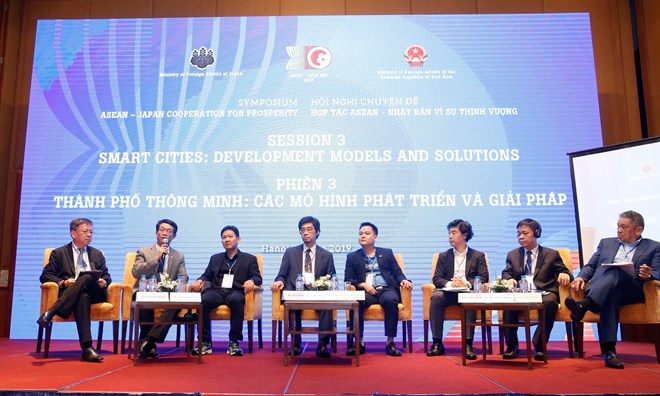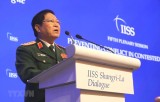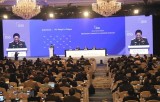Symposium seeks to strengthen ASEAN-Japan strategic partnership
Officials, experts, scholars and entrepreneurs from ASEAN countries and Japan gathered at a symposium in Hanoi on June 4 to discuss measures to lift the two sides’ strategic partnership to a new level.

Participants in a session on smart cities, part of the symposium on “ASEAN-Japan cooperation for prosperity” in Hanoi on June 4
The symposium, themed “ASEAN-Japan cooperation for prosperity”, was held by the foreign ministries of Vietnam, the coordinator of ASEAN-Japan relations for 2018-2021, and Japan.
Opening the event’s session on the ASEAN-Japan partnership, Vietnamese Deputy Foreign Minister Nguyen Quoc Dung said ASEAN and Japan have attained numerous cooperation achievements and become indispensable to each other.
To further promote peace, stability and prosperous development, they should continue coordinating closely with each other to make use of opportunities and overcome challenges, he noted.
He also suggested four priority directions for bilateral cooperation, namely enhancing mutual trust and respect and complying with the common principles of the partnership for peace and stability, bolstering win-win business cooperation, sharing responsibility and boosting joint efforts to ensure people’s living quality, and maintaining the sincerity and the “heart-to-heart” relationship.
Meanwhile, Japanese Deputy Foreign Minister Takeo Mori noted his country highly values ASEAN’s building of a vision for Indo-Pacific cooperation, adding that the two sides share many common basic principles, including Japan’s continuation of its support for ASEAN’s central role.
He also expressed his hope that Japan’s viewpoint on a free and open Indo-Pacific region will be connected with the Indo-Pacific vision of the bloc through practical cooperative activities.
Participants agreed that ASEAN and Japan need to continue promoting the high priorities at present like maritime security; trade, investment, digital economy, smart city building, and high-quality infrastructure development; innovation, human resources training, connectivity, economic integration and participation in regional value chains, thereby helping to narrow the development gap, ensure no one is left behind in the development process, and lift the ASEAN-Japan strategic partnership to a new level.
At another session, participants discussed the enhancement of business cooperation and directions for attracting Japanese investment in hi-tech agriculture in ASEAN.
Vietnamese Deputy Minister of Agriculture and Rural Development Le Quoc Doanh said the cooperation with Japan and ASEAN countries to help build high-quality agriculture with stable development in the region is a top priority in agricultural development of Vietnam.
In the time ahead, the Vietnamese Government will keep perfecting policies and improving the investment climate so as to attract investment in hi-tech agriculture, he noted.
Parliamentary Vice Minister for Foreign Affairs of Japan Norikazu Suzuki said modern machinery and technology will be an advantage of his country when it cooperates with ASEAN countries. It will send more experts to the grouping’s members to share agricultural experience while receiving apprentices from them.
At the session on population ageing, Secretary-General of the ASEAN-Japan Centre Masataka Fujita said the elderly will account for 21 percent of ASEAN’s population by 2050, doubling the current figure. The ageing speed in Vietnam is even faster than in other regional countries, with the rate of old people to reach 28 percent by 2050.
Sakarn Bunnag, Director of the geriatrics institute under the Department of Medical Services of the Thai Ministry of Public Health, said the opening of re-training and support establishments for old people like the ASEAN Centre for Active Ageing and Innovation, scheduled to make debut this November, will help disseminate knowledge and assist the implementation of policies targeting the elderly in ASEAN.
Meanwhile, Deputy Director of the Overseas Labour Department under the Vietnamese Ministry of Labour, Invalids and Social Affairs Pham Viet Huong said the population ageing in some countries like Japan is a great chance for exporting Vietnamese labourers. After returning home, these workers will be the core force in many services for the elderly in Vietnam.
As part of the symposium, the session on smart city development gave participants an insight into opportunities and challenges for the state and private sectors in this work. It also shared Japan’s experience to help ASEAN countries make their smart city building plans.
VNA
 Indonesia eyes to use fuel subsidy scheme to strengthen purchasing power
Indonesia eyes to use fuel subsidy scheme to strengthen purchasing power
 A glimmer of hope in the Middle East
A glimmer of hope in the Middle East
 Malaysia, Singapore step up cooperation in environmental protection
Malaysia, Singapore step up cooperation in environmental protection
 Malaysia's digital economy projected to reach 31 billion USD in 2024
Malaysia's digital economy projected to reach 31 billion USD in 2024
 Opportunity to enhance the position of the Global South
Opportunity to enhance the position of the Global South
 Thailand to build new bridge to Cambodia
Thailand to build new bridge to Cambodia
 Bulgaria charts new course with Vietnam on President’s upcoming visit: Diplomat
Bulgaria charts new course with Vietnam on President’s upcoming visit: Diplomat
 Seminar seeks ways to boost ASEAN - Latin America connectivity
Seminar seeks ways to boost ASEAN - Latin America connectivity
 Indonesia seeks India's help in health education
Indonesia seeks India's help in health education
 Indonesia named world's most generous country in 2024
Indonesia named world's most generous country in 2024



